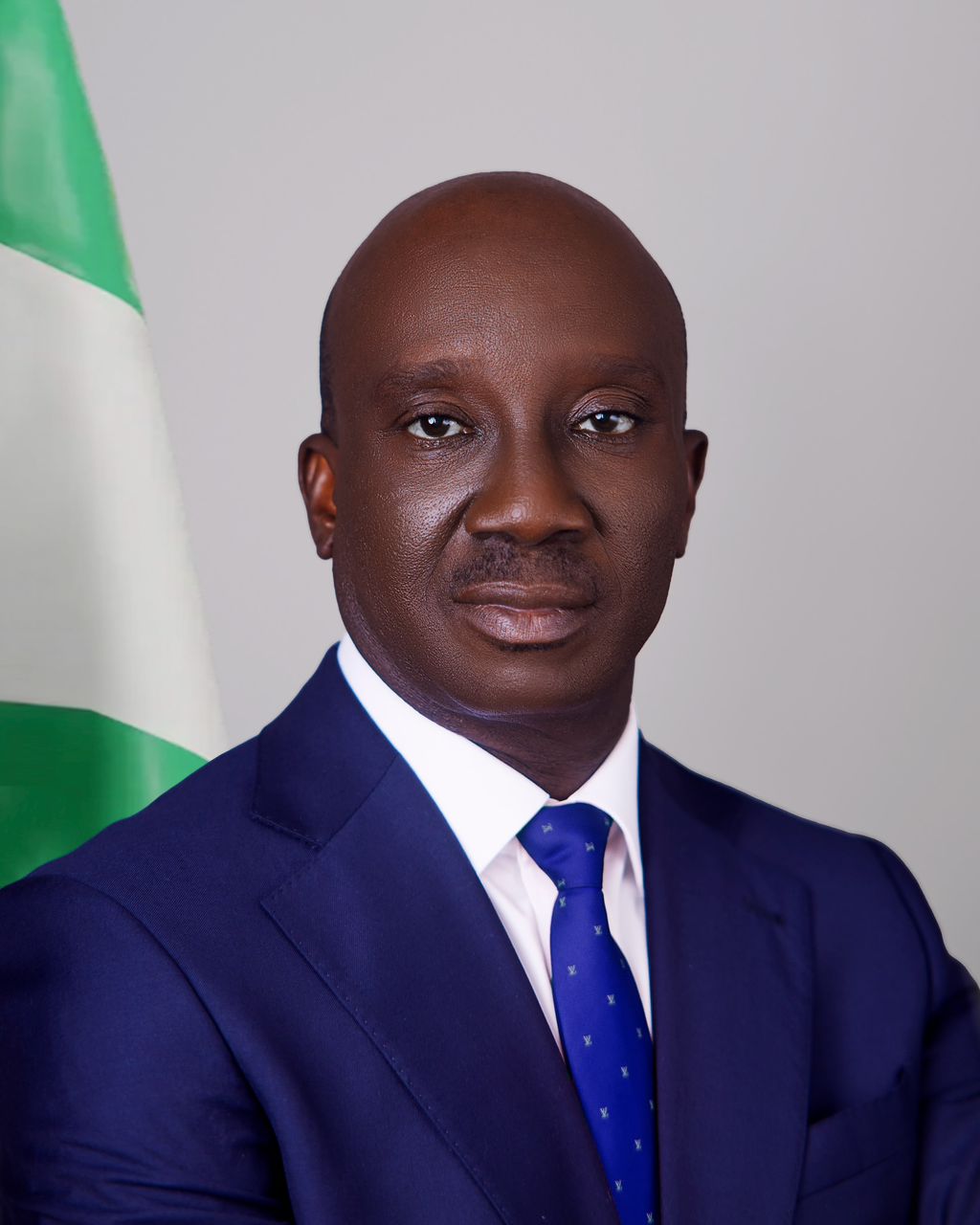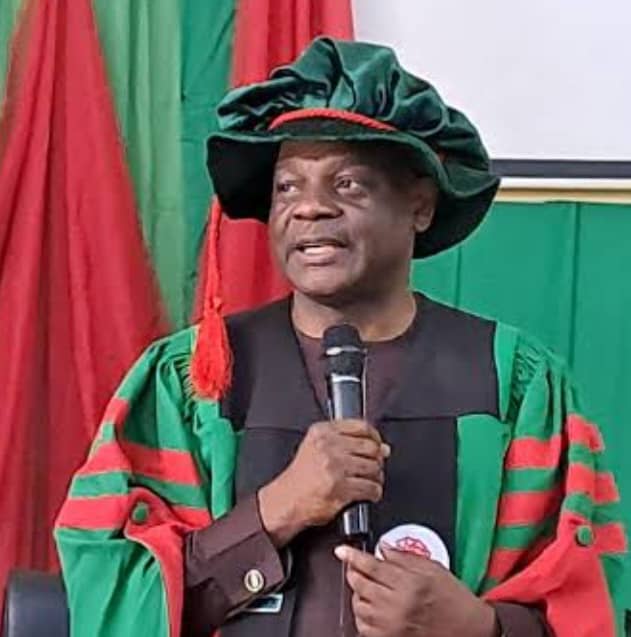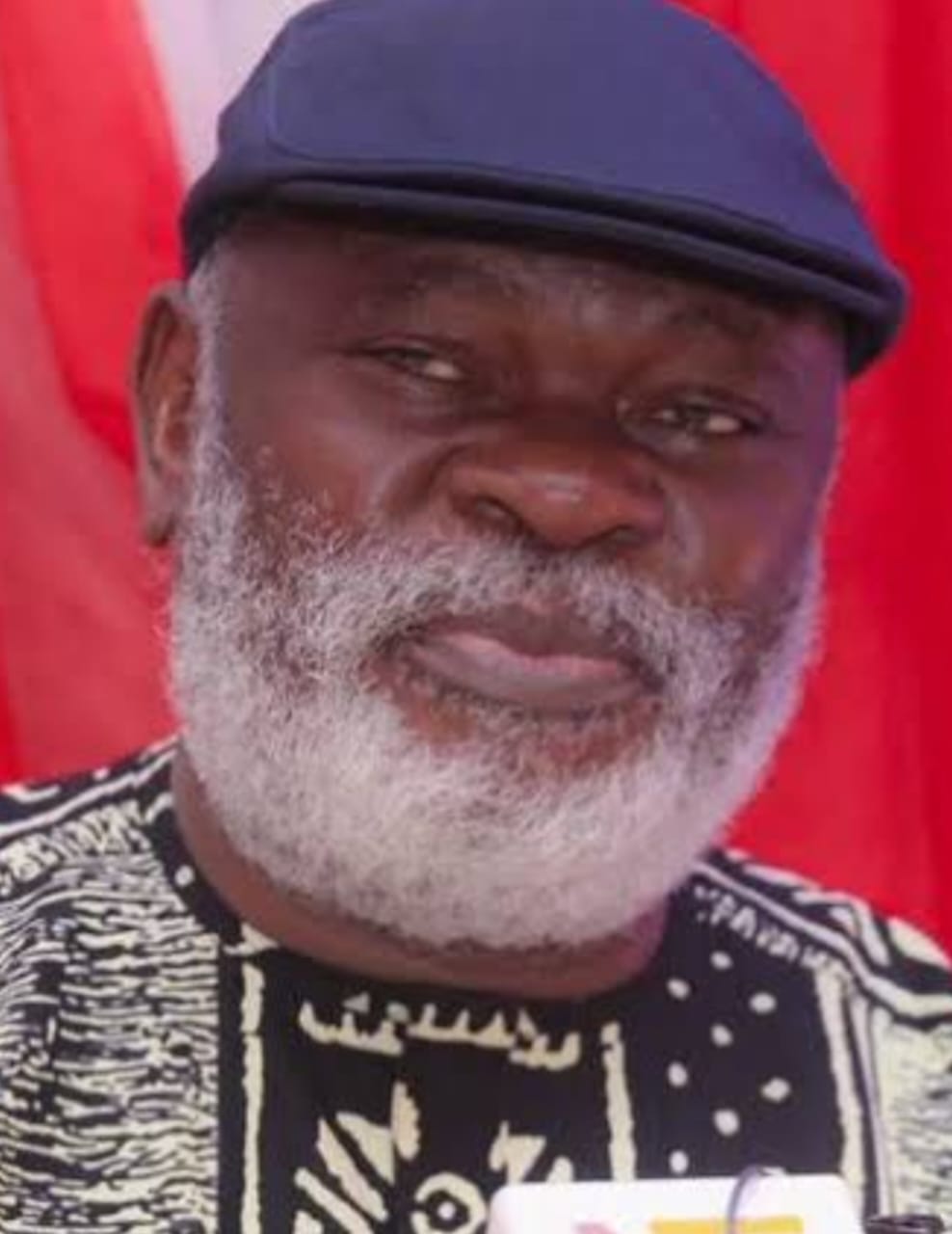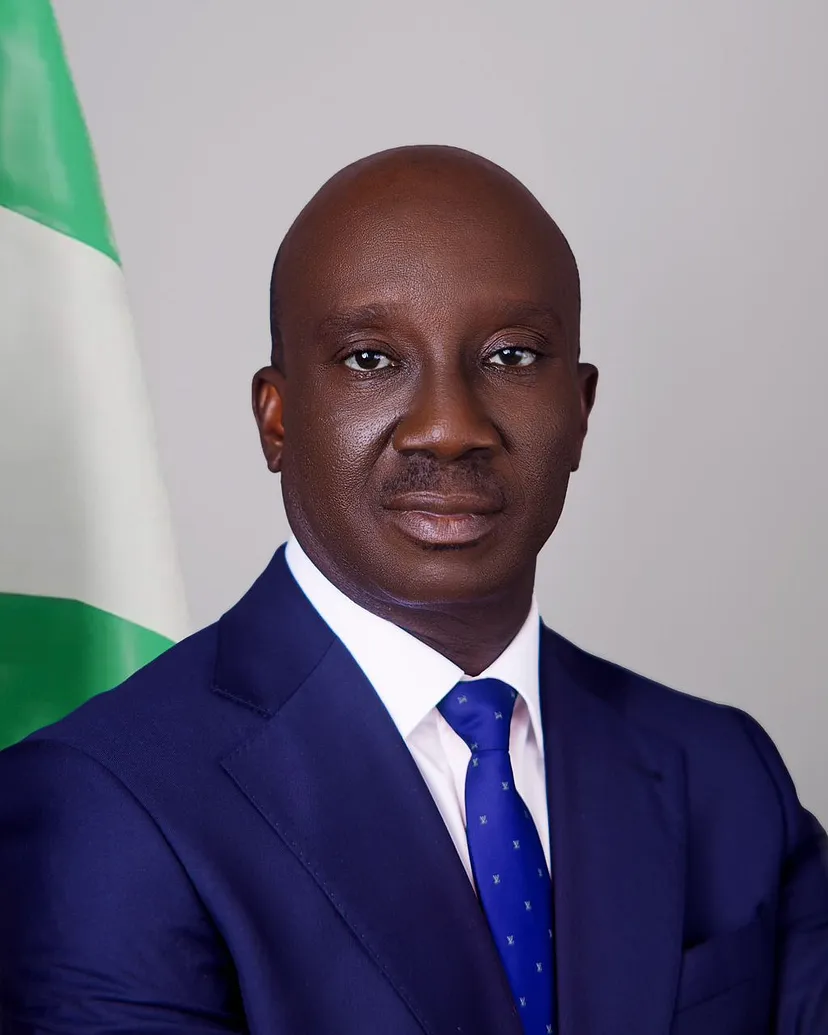Opinion
Okpebholo: Confounding the Doubters, Redefining Leadership in Edo

By Fred Itua
As I set out to pen this piece on this serene Sunday afternoon, my mind is drawn to the profound epistle of Apostle Paul to the Corinthians in 1 Corinthians 1:27-29: “But God hath chosen the foolish things of the world to confound the wise; and God hath chosen the weak things of the world to confound the things which are mighty; and base things of the world, and things which are despised, hath God chosen, yea, and things which are not, to bring to nought things that are: That no flesh should glory in his presence.”
Hallelujah!
I have chosen to begin this way because it resonates deeply with my assessment of Governor Monday Okpebholo’s leadership over the past two months.
When Senator Monday Okpebholo stepped into the political ring, many underestimated him. He wasn’t the loudest voice in the room, nor the most flamboyant. In a political landscape where the ability to raise dust often overshadows the capacity to lay foundations, Okpebholo’s calm and collected demeanor was dismissed as a weakness. But, as Apostle Paul aptly put it, God has a way of using the “foolish” things of the world to confound the wise. And indeed, Governor Okpebholo has confounded his critics with actions that speak louder than the hollow rhetoric of his predecessor.
To truly appreciate the transformation taking place in Edo State, one must first understand where we’re coming from. For eight long years, governance was more about optics than outcomes. The previous administration, under Governor Godwin Obaseki, was a masterclass in what the locals have dubbed “audio governance.” Projects were announced with great fanfare, but their execution remained a mirage. MoUs were signed and celebrated, only to gather dust in forgotten drawers. Roads that were critical to economic and social well-being were left to rot, with billboards proclaiming, “Please bear with us; this is a federal road,” as if to absolve the state of any responsibility.
Governor Okpebholo has flipped the script. He didn’t start his administration with loud declarations or endless ribbon-cutting ceremonies. Instead, he started with work—real, tangible work.
In just two months, Governor Okpebholo has demonstrated that governance is about delivering results, not excuses. The Benin-Auchi Road by Obadan Junction, long neglected, has received the needed attention. The failed portions of the Benin-Abuja Road in Ekpoma, which seemed destined to remain a nightmare for travelers, are now under repair. Roads that were mere campaign promises in the past, like Upper Ekenwan Road, are nearing completion.
Even the Aduwawa-Upper Mission Junction, a project that felt like a distant dream, is now coming to life. And let’s not forget the Temboga-Uteh Road, which now wears the Governor’s signature of progress.
One resident put it succinctly: “In just two months, this man has done more than others did in eight years. He doesn’t make noise; he makes things happen.”
Beyond roads, Governor Okpebholo’s administration is tackling the long-neglected healthcare sector. The construction of a modern health center in Udomi, Irua, is a testament to his commitment. The 2025 budget allocates N63.9 billion to healthcare and an additional N1.8 billion for a health insurance scheme, ensuring that no Edo citizen is left behind.
One of the most commendable moves of Governor Okpebholo’s administration has been his decisive action to sanitize Edo’s markets. By placing a ban on market unions, which had long been accused of oppressive and exploitative practices, the governor has brought relief to traders and consumers alike. These unions had been driving up the prices of food and commodities through arbitrary levies and monopolistic control, leaving ordinary Edo citizens to bear the brunt.
In his words, “Markets should be places of commerce and community, not oppression. We cannot allow a few individuals to profit at the expense of the majority.”
Since the ban, market prices have begun to stabilize, and traders have expressed gratitude for the governor’s intervention.
Edo State has not been immune to the scourge of insecurity, particularly the alarming rise in cult-related killings that claimed over 100 lives in 2024. Governor Okpebholo has tackled this issue head-on, adopting a consultative and inclusive approach. Through interagency consultations and his robust security meetings, he has fostered collaboration among law enforcement agencies and local communities.
This proactive engagement has led to a significant de-escalation of tensions and a peaceful resolution to many conflicts. As one community leader observed, “For the first time, we feel heard. The governor is not just issuing orders; he’s listening and acting.”
Another area where Governor Okpebholo has demonstrated his commitment to justice is in addressing the contentious issue of land grabbing. Under the previous administration, many communities and individuals saw their lands forcefully taken, their properties destroyed, and their voices silenced.
Governor Okpebholo has taken a firm stance, declaring that such lands will be restored to their rightful owners, provided they can present proof of ownership. This policy has brought renewed hope to many Edo citizens who had all but given up on ever reclaiming their ancestral lands.
“The government is here to serve the people, not to oppress them,” the governor stated. “We will right the wrongs of the past and ensure justice prevails.”
Governor Okpebholo’s 2025 budget, aptly titled the “Budget of Renewed Hope for a Rising Edo,” is a roadmap to sustainable development. With 63% of the N604 billion budget earmarked for capital expenditure, it’s clear where his focus lies.
* Road Development: N162 billion
* Education: N48 billion
* Health: N63.9 billion
* Agriculture: N75 billion
This is not just a budget; it is a statement of intent. It reflects the governor’s five-point agenda—security, infrastructure, healthcare, food sufficiency, and education—augmented by a renewed focus on agriculture.
Governor Okpebholo’s approach to governance can be likened to a diligent farmer. While others scatter seeds carelessly, hoping for a quick harvest, he tills the soil, plants with precision, and nurtures the crops. The results are already visible, and the harvest promises to be bountiful.
In reforming local government administration, the governor has brought discipline and transparency to a system that was previously plagued by inefficiency. His bold steps are setting a new standard for accountability and service delivery.
Governor Monday Okpebholo is proving that leadership is not about noise but results. He is confounding the critics and inspiring the citizens. As Apostle Paul wrote, God uses the weak and despised to bring about great things, and in Edo State, this truth is playing out before our very eyes.
Edo is rising, not on the wings of empty promises, but on the back of a governor who understands that actions speak louder than words. Indeed, Governor Okpebholo has become the farmer who sows in silence and reaps in abundance—a leader who delivers hope, one project at a time.
Fred Itua is the Chief Press Secretary to Edo State Governor
Opinion
BENUE 2027:The Apa/Agatu Quest for Equity

By Tunde Olusunle
It may be well over two years to the next cycle of general elections in Nigeria. For the people of Apa/Agatu federal constituency in *Benue South, however, the measure of their participation and integration into the governance scheme will be defined in the run-up to the general polls that year. Nine local government areas make up the predominantly Idoma country of Benue State also labelled Zone C in the senatorial tripod of the geo-polity. The zone is also home to the Igede ethnic stock and the Etulo. Local government areas in “Benue Zone C” include: Apa, Agatu, Oju, Obi, Ado, Ogbadibo, Okpokwu, Otukpo and Ohimini. The other zones, Benue North East and Benue North West, are wholly dominated by the Tiv nationality, striding across 14 local government areas. They are christened Zone A and Zone B in the local political scheme of the state. Federal constituencies in Benue South are: Apa/Agatu, Oju/Obi; Ado/Ogbadibo/Opokwu and Otukpo/Ohimini.

The subjugation of groups and ethnicities considered demographically smaller, by the larger groups which has dominated Nigeria’s politics over time, has not been any different for the Idoma of Benue State. Until the circumstantial emergence of a Yahaya Bello from the Ebira ethnicity in Kogi State in 2015, the Igala had the relay baton of governorship of Kogi State, in rounds and succession. The Ebiras and the Okun-Yoruba zones in the state could only aspire to be serial deputies or Secretaries to the State Government. This political template was virtually cast in stone. The Ilorin people of Kwara State have similarly wholly warehoused the gubernatorial office, sparingly conceding the position to other sociocultural groups in the state. The only exception was the concession of the seat to a candidate from Kwara South, in the person of Abdulfatah Ahmed, by his predecessor, Bukola Saraki in 2011. Even at that, there were murmurs and dissent from those who believed Ahmed came from a community too close to the Ilorin emirate to be of genuine Igbomina stock, which prides itself as the pure Yoruba species in Kwara State.
Twenty-six years into the Fourth Republic, the maximum proximity of the Idoma to Government House, Makurdi, has been by the customary allocation of the Deputy Governor’s slot to its people. Ogirri Ajene from Oju/Obi, the charismatic blue-blood of blessed memory, was deputy to George Akume, incumbent Secretary to the Government of the Federation, (SGF), from 1999 to 2007. Akume it was reported, genuinely desired to be succeeded by Ajene who exhibited competence and loyalty and could build on their legacies. The Tiv nation we understand, shot down the proposal. Gabriel Suswam succeeded Akume and had the urbane multipreneur, Stephen Lawani from Ogbadibo as deputy. Samuel Ortom, a Minister in the Goodluck Jonathan presidency who took over from Suswam opted for Benson Abounu, an engineer from Otukpo as running mate, while Hyacinth Alia, the Catholic priest who succeeded Ortom, also chose as deputy, Samuel Ode, who was also a Minister in the Jonathan government, from Otukpo. Arising from this precedence, Apa/Agatu has not for once, been considered for a place in Government House, Makurdi.
In similar fashion, the position of Senator representing Benue South, has repeatedly precluded Apa/Agatu federal constituency. David Alechenu Bonaventure Mark a former army General from Otukpo, took the first shot at the office in 1999. He was to remain in the position for five consecutive times, a distinctive record by Nigerian standards. Mark would subsequently become President of the Senate and the third most senior political office holder in the nation’s governance scheme for a string of two terms between 2007 and 2015. He was replaced by Patrick Abba Moro, who hails from Okpokwu and was a former teacher, in 2019. Abba Moro who previously served as Minister of Interior in the Jonathan government from 2011 to 2015, won a second term at the 2023 general elections and remains substantive Senator for “Benue Zone C.” He is indeed incumbent Minority Leader of the Senate, and thus a principal officer in the leadership scheme of the “red chambers.”
While Moro is barely two years into his second term, there are suggestions that he is interested in a third term which should run from 2027 to 2031! This is the core issue which has dominated contemporary political discourse in Benue South, especially from the Apa/Agatu bloc. For Apa/Agatu, it is bad enough that they are repeatedly bypassed in the nomination of deputy governors in the scheme of state politics. It is worse that they are equally subjugated by their own kinsmen within the context of politics in *Idoma and Igede land.* This is particularly worrying when both local government areas constituting the Apa/Agatu federal constituency, Apa and Agatu, are not in anyway deficient in human resources to represent Benue South. Names like John Elaigwu Odogbo, the incumbent *Och’Idoma* and respected clergy; Isa Innocent Ekoja, renowned Professor and Librarian; Sonny Togo Echono, FNIA, OON, Executive Secretary, Tertiary Education Trust Fund, (TETFUND), and John Mgbede, Emeritus State Chairman of the Peoples Democratic Party, (PDP), Benue State, readily come to mind.
Major General R.I. Adoba, (rtd), a former Chief Training and Operations in the Nigerian Army; Professor Emmanuel Adanu, former Director of the Kaduna-based National Water Resources Institute, (NWRI) and the US-based specialist in internal medicine, Dr Raymond Audu, are eminent Apa/Agatu constituents. There are also Ada Egahi, long-serving technocrat who retired from the National Primary Healthcare Development Agency, (NPHDA), and Super Eagles forward, Moses Simon, (why not, hasn’t the retired soccer star, George Opong Weah just completed his term as President of Liberia)? The Member Representing Apa/Agatu in the House of Representatives, Godday Samuel Odagboyi, an office previously held by Solomon Agidani, as well as Adamu Ochepo Entonu, is, like his predecessors, a prominent figure from the resourceful Apa/Agatu federal constituency.
The Olofu brothers, Tony Adejoh, a retired Assistant Inspector General of Police, (AIG), and David, PhD, a renowned management and financial strategist, who is also an Emeritus Member of the Benue State Executive Council during the Ortom dispensation, are from the same federal constituency. So is Abu Umoru, a serial entrepreneur who represents Apa State Constituency in the Benue State House of Assembly. The continuing intra-zonal alienation of Apa-Agatu from the politics of Benue Zone C, remains a sore thumb which must be clinically diagnosed and intentionally treated in the run-up to 2027.
If previous top level political office holders from Idomaland in general and Apa/Agatu in particular, had diligently applied themselves to tangible, multisectoral development of the zone and constituency, the present clamour for inclusiveness would probably been less vociferous. *River Agatu* which flows from Kogi State, and runs through Agatu before emptying into *River Benue,* is a potential game changer in the socioeconomy of Apa/Agatu, Benue South and Benue State in general. Properly harnessed, it can revolutionise agriculture and aquaculture in the state, beyond subsistence levels which are the primary vocations of the indigenous people. Rice, yam, guinea corn, millet and similar grains, thrive in the fertile soils of the area. These can support “first level” processing of produce and guarantee value addition beneficial to the primary producers, before being shipped to other markets. River Agatu can indeed be dammed to provide hydro-electricity to power the entire gamut of Idomaland.
The infrastructure deficit in Benue South with specific reference to Apa/Agatu is equally very concerning. A notable pattern in Nigerian politics is its self-centeredness, the penchant for political players to prioritise their personal wellbeing and the development of their immediate space. This has accentuated the ever recurring desire of people to ascend the political pedestals of their predecessors if that is the principal window by which they can also privilege their own primary constituents. Motorable roads are non-existent, seamless travel between communities therefore encumbered. Expectedly this has been a major impediment to subsistent trade and social engagements between constituents and their kinsmen. Primary health facilities are almost non-existent, compelling people to flock to Otukpo, headquarters of Benue South, for the minutest of medical advice and treatment.
Apa/Agatu pitiably bleeds from the relentless and condemnable activities of vagrants and bandits who have reduced the constituency into a killing field. Reports suggest that in the past 15 years, no less than 2500 lives were lost to the vicious attacks of marauders and trespassers in the area under reference. This unnerving situation has compelled engagements between concerned Apa/Agatu leaders, and the leadership of the Nigeria Police Force, (NPF). The prayer is for the swift establishment of a mobile police outpost in the troubled sub-zone to contain bloodletting. The proposal, anchored by AIG Tony Olofu, NPOM, (rtd), and Echono, has received the blessings of the police high command. At the last update, a commander for the outfit had been named, while the deployment of personnel had begun in earnest.
It is very clear that in the march towards 2027, Apa/Agatu will refuse, very vehemently, to be sidelined and trampled upon in the political scheme of their senatorial zone. Abba Moro may desire a third term in the Senate, but the people of Apa/Agatu are quick to remind him that his curriculum vitae as a politician is sufficiently sumptuous for him to yield the seat in the “red chambers” and sit back like an elder statesman. They remind you that for a man who began his working life modestly as a lecturer in the Federal Polytechnic, Ugbokolo in 1991, Abba Moro has done extremely well for himself in Nigerian politics. For reminders, Abba Moro was elected Chairman of Okpokwu local government in the state as far back as 1998. Ever since, he has remained a permanent fixture in Nigeria’s national politics.
The people of Apa/Agatu will put up a determined fight for the Benue South senatorial seat in 2027, and no one should begrudge them. They are the proverbial ram which was pushed to the wall, which must of necessity push back with angered horns to liberate itself. They are already engaging with their kith across “Benue Zone C” to ensure that intra-zonal equity, fairness and justice, prevails in communal politics.
Tunde Olusunle, PhD, Fellow of the Association of Nigerian Authors, (FANA), teaches Creative Writing at the University of Abuja
Opinion
The Prince Adebayo prescriptions for ease of doing Business: 15 Take-Aways

By Dr. Ag Zaki
On Thursday, 9 January 2025, Prince Adewole Adebayo presented a keynote address at the Radisson Blu Hotel, Ikeja, Lagos. The occasion was the annual conference of a group of professionals, business executives and experts codenamed J9C for January 9 Collective. The theme of the Conference was “Business and Policy Strategy: Examining the Role of Reform in enhancing the ease of doing business in Nigeria.” Prince Adebayo is a versatile cerebral man of many parts, a lawyer, a multimedia practitioner, a real estate investor, a large-scale miner, a philanthropist, a community developer, and the 2023 Presidential Candidate of the Social Democratic Party (SDP). The organisers of the J9C conference introduced him as an intercontinental lawyer because he currently practices law in over sixteen countries.
The full speech of Prince Adebayo at the occasion is available online and can be accessed by clicking at this url: https://youtu.be/SsHkcJbVNRg?si=ebvoOVqGh0zVOsnt or by scanning the QR code above. However, we are presenting the salient take-aways from this most incisive keynote address below for the convenience of interested persons and for the public good.
THE TAKE-AWAYS
Preamble
1. Not every change of policy or programme is a reform. A reform is a fundamental change in the activities, programmes, and policies structured to cause improvement. Genuine government reforms are people oriented and so citizens can interject, comment or contribute.
2. Reform may be internally motivated, externally forced or imposed, or technological driven.
3. The government of Nigeria must first reform itself to be able to implement development-oriented reforms to improve the country’s economic performance.
In general terms
4. Fiscal and monetary reforms are critical and are urgently required in Nigeria. While government can freely control its fiscal reforms, it must be bound by market forces for realistic and realisable monetary reforms.
5. Economic reforms must positively affect developmental policies, programmes and projects to engender economic growth, increase in efficiency, and lead to stability. Economic and political reforms must be implemented pari-passu for untainted policies and programmes.
6. Urgent structural reforms are required in areas of legal reforms, laws on banking controls and regulations, lending and borrowing as well as land matters.
In specific terms
7. Reforms which are aimed at targeting ease of doing business must be aligned with the Malam Aminu Kano maxim that “all civil servants should abstain from contracts or business”.
8. Nigeria must break the current odious and unwholesome conspiracies between policy makers, civil servants, and contractors, which can lead to irreversible endemic corruption, long foreseen by the revered Malam Aminu Kano, and which can permanently damage the economy.
9. Structural reforms must ensure that land laws open up maximum benefits and potentials of the land, encourage labour productivity and efficient and transparent entrepreneurship rules including registration, capital and lending matters.
10. Tax reforms should be broad-based, not about sharing of revenue but promoting productivity and competitiveness in all aspects of endeavours and infrastructure reforms should make transportation of people and goods safe and cost effective.
11. Monitoring economic crimes must be thorough and should go beyond arresting of “Yahoo boys” and those spraying Naira notes, but those devaluing the Naira and abusing economic rules and regulations.
Warnings
12. Adebayo left some stern terse warnings for the business sector and for the government of Nigeria.
13. Business executives and professionals should not ask or encourage government for specific reforms but for general broad-based reforms as firm-specific reforms can enhance operations of specific firms or business in the short term but will ultimately kill the industry.
14. Government should not meddle into business or be guided by partisan businessmen; government should meet business only at the junction of regulatory framework.
15. Government should be selfless and honest in carrying out reforms, incorporate measurable performance indices and ensure that reforms are implemented in a way not to inflict pains or punishment on the people.
# DrZaki25, 903 Tafawa Balewa Way, Abuja
Opinion
Governor Monday Okpebholo: A Blessing to Edo State

By Eigbefo Felix
His Excellency, Senator Monday Okpebholo, the Executive Governor of Edo State, has demonstrated that he is a blessing to the state through his policies, appointments, initiation of road construction across the three senatorial districts, and his deep love for the people of Edo State.
Governor Monday Okpebholo has begun fulfilling the five-point agenda he promised the good people of the state since his inauguration.
In the area of security, he has shown total commitment. He assured the people of Edo State that he would ensure their safety, and true to his word, the state remains peaceful, which has brought joy to its residents. He has provided the necessary support to security personnel.
The governor increased the subvention for Ambrose Alli University (AAU) from ₦40 million to ₦500 million. He also promised to address the issues facing AAU medical students. Additionally, he has started renovating primary and secondary schools across the state, underscoring his understanding of the importance of education.
The agricultural sector has taken a positive turn as Governor Okpebholo has allocated ₦70 billion to the sector. Recognizing agriculture’s importance to both the state and the nation, he is positioning Edo State to become the food basket of the nation with his investments in the sector.
During the electioneering period, Senator Okpebholo promised to create 5,000 jobs within his first 100 days in office. He has already begun the process, and soon, the people of Edo State will benefit from these employment opportunities. Unlike in the past, he will not rely on MOUs before making appointments. Furthermore, he has started appointing Edo State indigenes, rather than outsiders, to various positions.
Governor Okpebholo has commenced road projects across the state, from Edo South to Edo Central and Edo North. He believes that when roads are motorable, the prices of goods in the market will automatically reduce.
He has also begun investing in the health sector, understanding its critical importance to the people of Edo State.
Governor Monday Okpebholo’s initiatives and actions affirm his dedication to transforming Edo State for the better.
-

 Crime1 year ago
Crime1 year agoPolice nabs Killer of Varsity Lecturer in Niger
-

 News12 months ago
News12 months agoFCT-IRS tells socialite Aisha Achimugu not to forget to file her annual returns
-

 Appointment1 year ago
Appointment1 year agoTinubu names El-Rufai, Tope Fasua, others in New appointments
-

 Kogi1 year ago
Kogi1 year agoINEC cancells election in 67 polling units in Ogori-Magongo in Kogi
-

 Kogi1 year ago
Kogi1 year agoEchocho Challenges Tribunal Judgment ordering rerun in 94 polling units
-

 News1 year ago
News1 year agoIPOB: Simon Ekpa gives reason for seperatists clamour for Biafra
-

 Metro10 months ago
Metro10 months ago‘Listing Simon Ekpa among wanted persons by Nigeria military is rascality, intimidation’
-

 News1 year ago
News1 year agoKingmakers of Igu/ Koton-Karfe dare Bello, urge him to reverse deposition of Ohimege-Igu
